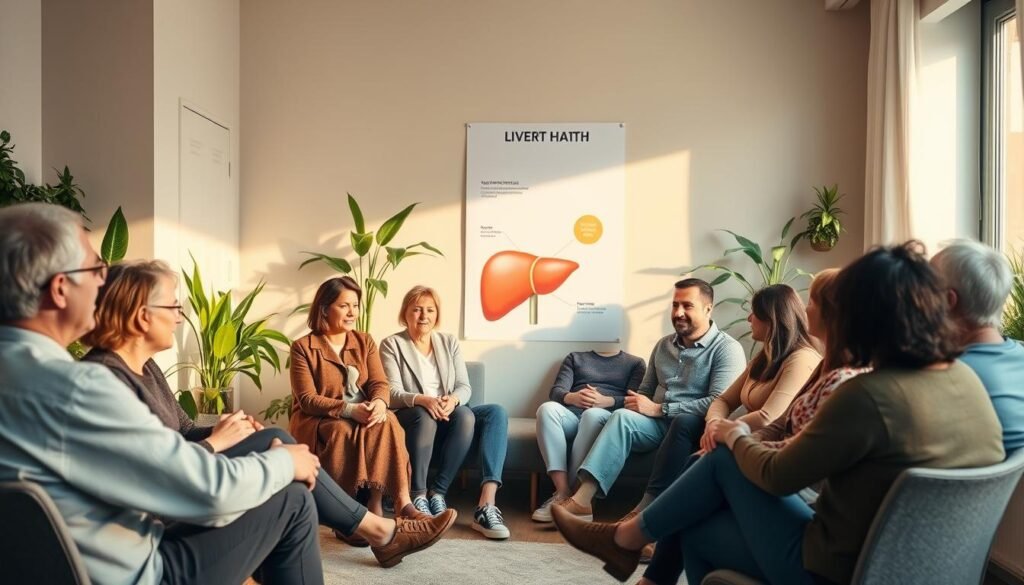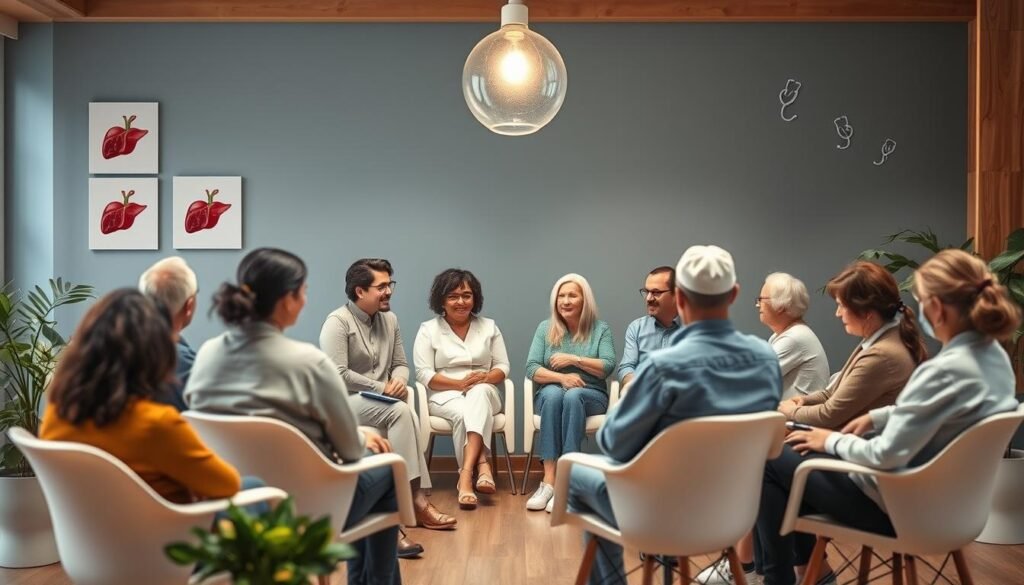About one in four Americans lives with fatty liver disease. This condition can cause serious health issues if ignored. It’s crucial to find support and advice from people who understand what you’re going through. Support groups and communities for those with fatty liver disease offer a place to share stories, get understanding, and receive helpful tips.
Joining a community for liver disease is incredibly important. It gives you a feeling of not being alone. You can meet others in person or connect online. These groups provide valuable advice, a listening ear, and new ways to look after your liver. This guide will show you where to find these important resources and why they’re key to feeling better.
Key Takeaways
- Fatty liver disease affects approximately 1 in 4 Americans.
- Support groups provide a platform for sharing experiences and advice.
- A sense of community can improve emotional well-being.
- Both local and online resources are available for support.
- Connection with others can lead to better management strategies.
Understanding Fatty Liver Disease
Fatty liver disease is when too much fat builds up in liver cells. There are two main kinds, NAFLD and AFLD. NAFLD happens without much alcohol and is more common. It’s found in about 100 million people in the U.S. Many have obesity, diabetes, or high cholesterol.
Many people with this disease feel tired or have belly pain. But often, there are no clear signs until it gets worse. At that point, it can cause serious liver problems. Knowing the risk factors is key to keeping your liver healthy. Things like being overweight, eating poorly, not moving much, and your genes can affect your risk.
To tackle fatty liver disease, you need to know what makes it tick. Getting to a healthy weight, eating right, exercising more, and drinking less alcohol are crucial steps. For more help and info, check out this link.
The Importance of Support in Managing Liver Health
Emotional support is key for liver patients. It helps them face liver disease with hope. Feeling isolated and anxious is common when living with a condition like fatty liver. Connecting with others in similar situations provides a crucial support network.
Support groups are a treasure for those dealing with liver health issues. They are more than just meetings; they are a place to share advice and feelings. In these groups, sharing personal stories helps members feel less alone.
Studies show how important social support is for liver disease management. Being part of these groups leads to better health outcomes. Members support each other, making it easier to handle their condition. This engagement lifts spirits and encourages people to look after their health.
Seeking emotional support through groups is beneficial. It allows individuals to find comfort and strength among peers. By sharing their experiences, they build a community. This community not only helps manage liver disease but also improves life quality.
Support Groups and Communities for Fatty Liver Disease
Finding the right support for fatty liver disease is key. It helps in managing the condition well. Support groups offer a space to share experiences and gather useful info. They come in various formats to meet different needs and preferences.
Local vs. Online Support Options
People can find local support groups and online communities. Local groups allow face-to-face interaction. They help build friendships with those facing similar issues. This warm, in-person setting is highly valued.
Online communities provide easy access from home. This is vital for those with health or mobility issues. Forums and social media groups are available 24/7. This means support is always there when needed.
Benefits of Joining a Support Group
Support groups offer more than just friendship. Members gain valuable knowledge about managing fatty liver disease. They share nutrition tips, coping mechanisms, and treatment updates. All this information is crucial for better health.
These groups provide emotional comfort and accountability. You’re not alone in your journey. Getting support and understanding from others motivates healthier lifestyle choices. It empowers members to actively improve their health.
| Support Group Type | Advantages | Challenges |
|---|---|---|
| Local Support Groups | Face-to-face interaction, immediate emotional support | Limited to specific times and locations |
| Online Liver Disease Communities | Accessibility, convenience, ability to connect anytime | Less personal interaction, potential for misinformation |
For more resources, the Global Liver Institute connects individuals with local groups and online communities. It offers valuable information for those in need.
Where to Find Liver Health Support Groups
Finding support for managing fatty liver disease can be a game-changer. People looking for help have several options. They range from local hospital programs to online sites. These resources offer valuable support and information.
Hospital and Clinic Resources
Many hospitals and clinics have special support networks for liver disease. These programs often include:
- Educational seminars that teach how to manage the disease.
- Support groups for sharing experiences and finding encouragement.
- Nutritional counseling to help create a healthy eating plan.
- Access to specialists for personalized medical advice.
For more details, patients should contact their local hospitals or liver clinics. They can offer hospital resources that help in the recovery process.
Online Directories and Listings
Online directories help connect people with others facing similar challenges. For instance, the American Liver Foundation has listings that include:
- Local support groups.
- Virtual meetings for those who can’t meet in person.
- Guides for treatment options.
This makes it easy for patients to find support networks that suit them. Thanks to online resources, help is available for everyone, no matter where they are.

| Resource Type | Description | Example |
|---|---|---|
| Hospital Support Group | Regular meetings led by healthcare professionals. | Local Liver Clinic |
| Nutritional Counseling | Personalized meal planning and diet management. | Community Health Center |
| Online Support Group | Virtual forums for sharing experiences and advice. | American Liver Foundation Forum |
| Patient Education | Workshops and webinars on liver health topics. | Hospital Educational Program |
Joining Online Communities for Liver Disease
Facing fatty liver disease is tough, but the internet has lots of support. Online forums for fatty liver disease let you meet others who understand. You feel like you belong and learn lots through stories and tips.
Popular Fatty Liver Online Forums
Online, there are many places for those with liver disease to talk and share. In these forums, you can get advice, ask questions, and feel less alone. Here are some good ones:
- PatientsLikeMe: A famous site where patients share insights and keep track of their health, offering a supportive space to talk.
- HealthUnlocked: This site has many groups, including those for liver health, where you can share and get advice.
- Facebook Groups: There are private groups just for fatty liver disease, where members share and find support within a big online liver disease community.
- Reddit: Subreddits focused on liver health are less formal, offering advice and support from those who understand liver patient struggles.
Being a part of these online spaces can really help with understanding liver disease and feeling better emotionally. Sharing your story in these communities can boost your confidence in handling health issues.
Personal Stories and Testimonials
Sharing personal stories of liver disease can really help those facing similar battles. These stories often share the hard parts and victories faced by people with fatty liver disease. For many, hearing experiences with fatty liver from others is incredibly valuable.
Many people in support groups talk about how these groups have helped them. One person said,
“Joining a support group changed my life. I realized I wasn’t alone in my battle.”
This shows how powerful being with others who understand can be. It shows that you don’t have to deal with liver disease on your own.
People often talk about how they deal with personal stories of liver disease. They share tips on eating better, finding support, and managing their health. These tips are not just helpful; they make people feel they belong to a community.
Here’s a table of key themes from support group stories:
| Theme | Example Quote | Impact |
|---|---|---|
| Sense of Community | “The friendships I made are invaluable.” | Enhanced emotional support |
| Hope and Inspiration | “Hearing others’ successes motivated me to keep fighting.” | Increased motivation to adhere to treatment plans |
| Sharing Knowledge | “I learned about better nutrition from the group.” | Improved management of fatty liver |
These stories and the power of community can motivate others to seek help. They can bring hope to others’ journeys with liver disease.
How Support Networks Aid in Emotional Well-being
Support networks are vital for improving emotional well-being, especially for those battling liver disease. By connecting with others who are going through the same struggles, a sense of belonging grows. This can help decrease the loneliness that often comes with chronic diseases. These groups offer friendship and emotional support that’s invaluable.
Support groups bring psychological benefits that have been proven over time. People in these groups often feel less stressed and more hopeful. When they share their stories, they not only uplift themselves but also help others become stronger.
Group members share tips on managing liver disease. This advice gives practical help and emotional comfort. Learning from each other’s experiences, they find new ways to cope. They also draw encouragement from the successes and challenges of their peers.
In short, joining a support network can greatly boost one’s mental health when facing liver disease. It offers emotional support and a place to share and learn.
Connecting with Healthcare Providers
Effective support for liver disease depends on patients and healthcare providers working together. Trust and open communication are key. They make managing liver disease easier. Patients should openly share their concerns about liver health.
Tips for better conversations include:
- Prepare questions before appointments so you cover everything important.
- Be truthful about symptoms and how you live, since they affect liver health.
- Check in with doctors about treatments and changes you should make.

Talking to medical experts helps get the right treatment and find support. Patients should ask about support groups and being part of a liver care team. Being active in care discussions can improve both treatment and emotional support.
There are many support communities for liver disease online, like healthcare support groups. These groups provide emotional and social help, which is crucial for handling the disease.
Working together with healthcare teams helps patients manage their liver health. It also helps them get the ongoing support they need.
Resources for Fatty Liver Patients
Having access to the right resources is key for those with fatty liver disease. They can learn a lot from materials and events made just for them. This helps increase their liver health knowledge and awareness.
Educational Materials
Learning more about fatty liver is crucial. Healthcare providers have brochures, articles, and online stuff. They talk about how to change your lifestyle, what to eat, and treatment choices. Using these fatty liver disease resources helps people make good health choices.
Webinars and Workshops
Webinars on liver disease keep patients informed about new research and treatments. Experts talk about liver health topics in these online meetings. Workshops also let people ask questions and share stories, building support within the community.
| Resource Type | Examples | Benefits |
|---|---|---|
| Informational Brochures | American Liver Foundation | Easy to understand, accessible information |
| Online Articles | National Institutes of Health | Current research and treatment options |
| Webinars | Local health clinics | Expert insights, Q&A opportunities |
| Workshops | Community health programs | Hands-on learning, peer support |
Creating Your Own Support Network
Building a support system is crucial if you’re dealing with liver disease. You can improve your emotional strength and find encouragement by creating a support network. Here are some tips for creating a support group:
- Use social media to meet others facing similar liver disease challenges.
- Work with community centers for liver health workshops or meetings.
- Contact healthcare facilities to find others needing liver disease support.
- Create an online group for people unable to meet face to face.
- Do activities as a group to share knowledge and coping methods.
Aim to create a safe place for open talks. Using these resources helps people build meaningful connections. It keeps them updated on liver health.

Having community support changes the game in managing liver disease. Taking steps to form a support network offers precious emotional and informational help when it’s needed the most.
Conclusion
The journey to manage fatty liver disease gets better with the right support. Support groups and communities offer valuable help. They give practical information and foster connections for emotional health.
It’s key to understand the value of community for those with liver disease. Meeting others with similar experiences can boost motivation and create a sense of belonging. There are many resources to help make informed care and health decisions.
By using the resources mentioned, individuals can take an active role in their health. Finding local or online support groups leads to meaningful connections and improved life quality. Everyone facing fatty liver disease should have support to uplift and empower them towards better health.